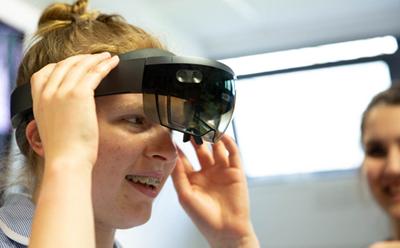Trialling the high-tech SMART Nurse technology of the future

Student nurses at Southampton are helping develop research that could save the lives of people suffering cardiac arrests. The nurses are trialling innovative SMART technology that could enhance the way people carry out CPR.
Cutting-edge technology such as SMART watches, SMART glasses and HoloLens are being created to help ensure that CPR is being given effectively and correctly even if the person giving it has no first aid experience.
All of the technologies are designed to help people (whether a lay member of the public or a healthcare professional) enhance their resuscitation techniques. The SMART watch flashes and vibrates to demonstrate the correct rhythm CPR should be given, the SMART glass can feedback on how deep compressions should be, while the HoloLens projects an augmented reality hologram to give CPR instructions.
Before the technology can be further developed to go out on the streets, tests have to be carried out to assess its capabilities and effectiveness, and this is where Southampton students are proving key. A group of Year 1 and Year 3 nursing students are being asked to try out the technologies and give their feedback to help shape their design and application.
Dr Mary Gobbi, Professorial Fellow for Health Care Education at Southampton, says, “Firstly we are testing our students’ ability to give CPR from memory, and then we are giving them the chance to practice with one of the technologies. We will reassess their CPR to see whether it enhances their ability to perform cardiac compressions better.
Final year student Dominique took part in the trials, "My resuscitation technique has improved following the use of the technology. It gives a very good indication of how quickly you need to actually do the resuscitation and the chest compressions. This type of technology isn't something we see in everyday practice - hopefully we will see it in practice in the future."
Dr Ellie Monger, a Lecturer in Critical Care Nursing and colleague of Dr Gobbi, adds, “To see if one of the technologies should be developed further, we need to make sure that it is useable for the lay person on the street who has no experience whatsoever.”
The trials are part of a €100,000 EU funding collaboration between the University of Southampton (Health Sciences and Electronics and Computer Sicence) and the German Research Centre for Artificial Intelligence. It is a great example of the commitment Southampton has to incorporating research into education, and builds on more than a decade of the University’s research into health and technology.